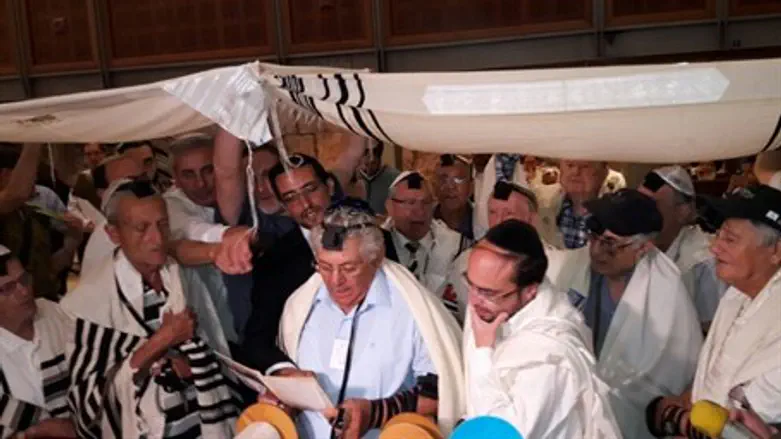
Fifty Holocaust survivors who were prevented from having a Bar Mitzvah by the genocidal Nazis finally did so during an emotional event at the Western Wall (Kotel) in Jerusalem on Monday.
The septuagenarians and octogenarians were given Bar Mitzvah and Bat Mitzvah ceremonies, which are normally staged for male and female Jews at age 12 or 13, in an event held ahead of Israel's Holocaust Memorial Day.
The 13 men and 37 women had mostly missed their ceremonies due to the war and its after effects, so Israel's government organized a joint one at the Kotel which is an outer wall of the Temple Mount, the holiest site in Judaism.
The male survivors donned tefilin (phylacteries), and a number of them cried during the kaddish memorial prayer sung to commemorate the Holocaust.
Gal Moshe, an 80-year-old who came to Israel from Poland after World War II, said it was an emotional day.
"The memorial prayer moved me particularly as I thought of my family, and especially of my mother. I literally cried."
Moshe, who said he was unable to discuss the Holocaust, was never given a Bar Mitzvah in Poland.
After the war and emigrating, "the economic situation was so difficult for us that we didn't even think about doing the Bar Mitzvah."
"When I found out I could do a Bar Mitzvah now I wanted it a lot and I also asked my two grandsons to come with me. I was at their Bar Mitzvah and now they are at mine."
Delayed by poverty or the Soviets
For Jews, a Bar or Bat Mitzvah - literally the son or daughter of commandment - is when children become adults and responsible for their own observation of Jewish law.
Dr Robert Rozett, director of the libraries at the Yad Vashem Holocaust Remembrance Center, said huge numbers of Jews suppressed their faith during the war - meaning many thousands missed out on the ceremonies.
"For many, many people (Bar Mitzvahs) were not something they could have, either because they were in a place where there was no religious observance, because it wasn't allowed or maybe they were in a camp."
He said there were a number of reasons why those who missed the ceremony at the age of 13 were unable to do it once their lives stabilized, including poverty.
Others, like Yitzhak Rezink, found themselves in the Soviet Union where Judaism was largely outlawed.
He survived the war in the Kovno ghetto in Lithuania but was "left alone after my parents were murdered."
After the war, the Soviet forces took control and Judaism was suppressed.
"The Russians took over at the end of the war and we couldn't leave until 1970," he said.
A 2015 study found that some 45,000 of Israel's estimated remaining 190,000 Holocaust survivors are now living in poverty, while estimates of those in America and other countries are also high.
International Holocaust Remembrance Day is held on January 27 but Israel commemorates it separately on Thursday.
About six million Jews were murdered at the hands of Nazi Germany and its allies during World War II.
AFP contributed to this report.
